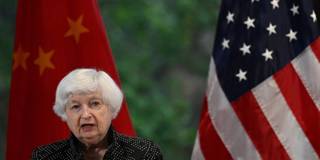While the availability of cheap electric vehicles is good news for the planet and for consumers everywhere, it is bad news for shareholders and employees of Western car companies, and both the United States and Europe are considering imposing import tariffs on Chinese EVs. But tariffs are the wrong approach.
NEW YORK – US Treasury Secretary Janet Yellen’s nearly weeklong visit to China, now underway, will most likely focus on US concerns about Chinese subsidies to producers of electric vehicles and other clean-tech goods. While the availability of cheap EVs is good news for the planet and for consumers everywhere, it is bad news for shareholders and employees of Western car companies, and both the United States and the European Union are considering imposing import tariffs on Chinese EVs. But tariffs are the wrong approach.
EVs are superior to ICE (internal combustion engine) cars in many ways. They are the world’s best hope for decarbonizing passenger vehicles, short of moving away from cars altogether. They can provide crucial energy storage capacity for the electric grid, aiding broader decarbonization efforts, which in turn will cut EVs’ carbon footprint further. And their faster acceleration and smoother ride underpinned the early success of Tesla and other high-end EVs.
That first-mover advantage has since dissipated. Tesla has lost 30% of its market value since January, struggling to keep up with BYD and other much cheaper Chinese competitors. That, too, is good news for the climate. Chinese oil demand is likely to have peaked last year, according to China’s state oil company. The reason is obvious: EVs and hybrids now account for roughly 40% of new car sales, twice the global share.

NEW YORK – US Treasury Secretary Janet Yellen’s nearly weeklong visit to China, now underway, will most likely focus on US concerns about Chinese subsidies to producers of electric vehicles and other clean-tech goods. While the availability of cheap EVs is good news for the planet and for consumers everywhere, it is bad news for shareholders and employees of Western car companies, and both the United States and the European Union are considering imposing import tariffs on Chinese EVs. But tariffs are the wrong approach.
EVs are superior to ICE (internal combustion engine) cars in many ways. They are the world’s best hope for decarbonizing passenger vehicles, short of moving away from cars altogether. They can provide crucial energy storage capacity for the electric grid, aiding broader decarbonization efforts, which in turn will cut EVs’ carbon footprint further. And their faster acceleration and smoother ride underpinned the early success of Tesla and other high-end EVs.
That first-mover advantage has since dissipated. Tesla has lost 30% of its market value since January, struggling to keep up with BYD and other much cheaper Chinese competitors. That, too, is good news for the climate. Chinese oil demand is likely to have peaked last year, according to China’s state oil company. The reason is obvious: EVs and hybrids now account for roughly 40% of new car sales, twice the global share.